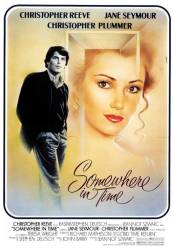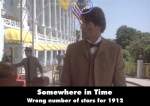Richard Collier: Please, don't leave. You have no idea how far I've come to be with you.
Richard Collier: I owe you an apology. I understand you now. You have nothing but the best motives in mind for her, but so do I.
Older Elise: Come back to me.
Elise McKenna: Reechard. Reeeeeeechaaaarrrrd.
Elise McKenna: There is so much to say... I cannot find the words. Except for these: 'I love you.'.
Richard Collier: Arthur, you know in the Hall of History, there's a photograph, a young woman. There's no nameplate.
Arthur Biehl: Yes, that's Elise McKenna. She was a famous actress in her day. Starred in a play in the hotel theater.
Richard Collier: I-I'm sorry. Did you say there was a theater here?
Arthur Biehl: Yes. Down by the lake.
Richard Collier: Really? When was this play done?
Arthur Biehl: 1912.
William Fawcett Robinson: Excess within control.







Answer: Because they had met before. When Richard went back in time to 1912, Arthur was a five-year-old boy. Old Arthur remembers, or at least recognizes, Richard from that time.
raywest ★
Except that Richard hadn't travelled into the past yet.
Like all time-travel fiction, if he will, then he already did. The portrait he saw in the gallery of Jane Seymour is another example: He brought the smile to her face and IIRC, she changed her pose upon seeing him.
kayelbe
Exactly right. Time-travel films rarely make sense plot-wise. They employ a "suspension of disbelief" where the audience just accepts the premise so the story can be told, regardless of whether or not everything makes sense. As I recall, Jane Seymour's "old character" told Richard to "come back to her," meaning she wanted him to go back in time to when she was young.
raywest ★
Time Travel movies and shows do this sort of thing often. This movie actually keeps to the premise of time travel pretty well.